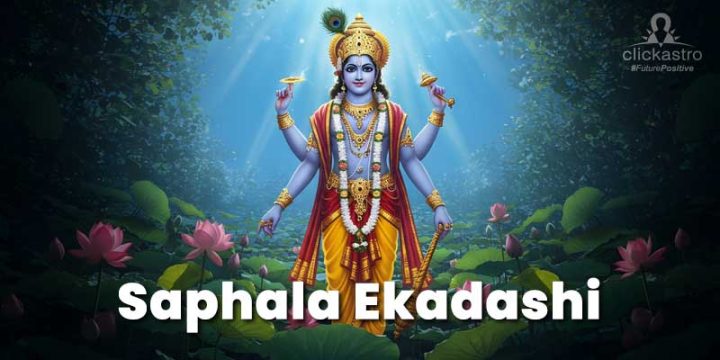Saphala Ekadashi 2025
The eleventh day of the lunar phase is known as Ekadashi. Each Ekadashi is considered holy and has a special significance intended for Lord Vishnu worship. The Saphala Ekadashi is observed in the month of “Pausa” during the
Krishna Paksha or the waning phase of the Moon. According to the
Gregorian calendar, this corresponds to December and January.
Like all other Ekadashi days, Saphala Ekadashi, also referred to as “Pausa Krishna Ekadashi,” is devoted to Lord Vishnu. On this day, worshippers offer intense devotion to Lord Krishna, a manifestation of Lord Vishnu. In comparison to other Ekadashi days, Saphala Ekadashi is considered to be superior. The person is absolved of all of their sins in life. In Hindi, the word “Saphala” denotes success or prosperity.
It is believed that keeping vrat on Saphala Ekadashi day will bring the devotee great happiness and success in life. The Ekadashi days are traditionally considered as days when a person’s spiritual needs come before their physical needs. The day of Saphala Ekadashi is extremely important to Vaishnavism devotees. Special pujas are performed on this day in Lord Krishna temples all over India.
Read Detailed
Yearly Horoscope Predictions 2026
When is Saphala Ekadashi in 2025?
In the year 2025, Saphala Ekadashi will be observed on Monday, December 15th.
Important Timings On Saphala Ekadashi
- Sunrise: 6:33 AM on December 15, 2025
- Sunset: 6:06 PM on December 15, 2025
- Ekadashi Tithi Begins: 06:49 PM on December 14, 2025
- Ekadashi Tithi Ends: 09:19 PM on December 15, 2025
- Hari Vasara Begins: 09:19 PM on December 15, 2025
- Hari Vasara Ends: 03:59 AM on December 16, 2025
- Parana Time: 06:36 AM – 08:54 AM on December 16, 2025
- Dwadashi End Time: 11:57 PM on December 16, 2025
This Saphala Ekadashi, discover what helps you thrive — Explore your stars!
Saphala Ekadashi Puja Rituals
On Saphala Ekadashi devotees pray to Lord Krishna and devote the day to his worship. The idol of Sri Krishna is given a holy bath and adorned with ornate clothing and ornaments. On this day, Tulsi leaves are offered to Lord Vishnu in an effort to atone for one’s sins. By offering incense sticks, coconuts, betel nuts, and other fragrant objects, devotees appease Lord Vishnu. A ghee lamp or Diya is lit in front of the idol to invoke Lord Krishna’s blessings,
The most significant ritual of Saphala Ekadashi is the Saphala Ekadashi vrat. The fast starts at dawn on Ekadashi and lasts until dawn on Dwadashi, the following day. Some devotees observe strict fasting, while others only observe partial fasting. When fasting rigidly, the devotee spends the entire vrat period without eating anything.
While partially fasting, however, some fruits and dairy products are consumed. The food needs to be saatvik. Those who cannot adhere to rigorous fasting for health reasons observe partial fasting.
The Saphala Ekadashi observer should devote the entire day to worshipping Lord Krishna. The devotee may light diyas in the temple of Lord Krishna in the evening. On the eve of Ekadashi, it is also forbidden to sleep through the night.
The vrat observer should refrain from sleeping the entire night on the day of Saphala Ekadashi. They participate in a variety of kirtan and bhajan activities in Lord Vishnu’s honour. Devotees listen to Lord Vishnu’s well-known stories. ‘Aarti’ is performed at the conclusion, and then Prasad is given out to family members. On Saphala Ekadashi, one must give food, money, and other necessities to the poor and Brahmins.
On the day of Saphala Ekadashi, charitable donations are highly recommended. It could be anything necessary for day-to-day living, including food, money, clothes, and other necessities.
During Ekadashi, devotees must abstain from consuming meat, alcohol, garlic, and onions.
Picking leaves or fruits from any tree or plant is not advised because it is considered to be inauspicious.
Read about
Mokshada Ekadashi
Saphala Ekadashi Vrat Katha
The kingdom of Champavati was ruled by King Mahishmat, who had five sons. Prince Lumbaka was the eldest of all. Prince Lumbaka was unruly, careless, and impolite. He engaged in a lot of sinful activities and was always challenging the authority of Lord Vishnu. Lumbaka was expelled from the kingdom by the king when his crimes reached new heights. However, Lumbaka persisted in his immoral actions and pillaged the riches of the underprivileged villagers. Finally, the king’s men caught him in the act.
However, because he was still a prince, he was freed and absolved of the crime. Lumbaka lived under a banyan tree all day and all night. He would consume raw meat from slaughtered animals. But over time, his conscience began to grow heavier due to his sense of isolation and melancholy. Lumbaka began to reflect and understood how his actions, habits, and behaviour had ruined his life.
He felt guilty about his sins and felt remorse. Later, on Saphala Ekadashi, Lumbaka fell ill. As a result, he was unable to eat anything during the day or sleep during the night. Lumbaka thus unwittingly performed the Saphala Ekadashi Vrat. The next day, Lumbaka went into the forest as he felt better and picked some fruits, and then offered them to Lord Vishnu. Lumbaka’s life was completely altered by this incident.
He restarted his life the following day and went back to his kingdom. The king appointed Lumbaka as his successor after learning of his transformation. The vrat that Lumbaka unknowingly observed on the Ekadashi Tithi bore fruit for Lumbaka. Lumbaka then ruled his kingdom for a very long time. After his death, he was granted a place in Vaikunth (abode of Lord Vishnu).
The Significance of Saphala Ekadashi
The Brahmanda Purana describes a conversation between King Yudhishthira and Lord Krishna in which they discuss the significance of Saphala Ekadashi. It is thought that the Saphala Ekadashi vrat is more virtuous than any kind of sacrifice or pilgrimage. The scriptures state that fasting on Saphala Ekadashi is more advantageous than performing the Rajasuya Yagna and Ashvamedha Yagna.
The person who observes this holy vrat will find salvation, or “moksha,” as well as unbounded fame and victories in life. The Saphala Ekadashi has such power that anyone who observes it will be released from the never-ending cycle of birth and death and will move into Lord Vishnu’s ultimate abode, known as “Vaikunth.”
On the Saphala Ekadashi day, bad fortune is said to be changed into good fortune. It has the ability to make desires and dreams come true. Additionally, it brings the observer inner peace and satisfaction.
Download Your Free
Wealth Horoscope







